The Lodge at Cloudcroft: A Century-Old Icon's Renaissance
Owner Joe Duncan shares the journey of restoring a mountain gem.

Imagine Cloudcroft without the Lodge.
Go ahead, take a moment.
Cloudcroft without its iconic 125-year-old hotel. The one fine dining restaurant we have. The golf course. The premier venue for weddings, political fundraisers, and business retreats. The most architecturally significant structure in Cloudcroft.
The Lodge is synonymous with Cloudcroft, featured in magazines and travel websites for decades. The one business it seems everybody in the area has worked at some point in their life.
The heart and soul of the Village.
Gone.
Since 1899, the Lodge survived a destructive fire in 1909, was rebuilt and relocated in 1911, and survived the management and sometimes mismanagement of various ownership groups.
Years ago, when times were hard, plans existed to subdivide the golf course into cabin lots. Even the copper-plated sentinel almost ended up in an auction as former owners tried to strip mine the property for money. At times, the Lodge's future seemed in doubt.
Today, the Lodge stands proud and reinvigorated.
Fortunately, Joe and Lanna Duncan have owned and operated the Lodge since 2015. They are hoteliers known for restoring two historic hotels in West Texas: El Capitan in Van Horn and Paisano in Marfa. They have invested time, money, and care to restore the Lodge at Cloudcroft and make it a sought-after destination.
When the pandemic hit, they did necessary renovation work to the Lodge’s cozier rooms, increasing many in size, and painted the exterior a refreshing forest green.
When the restaurant hit new lows last year, they brought in Chef Richard Lepree, who, in short order, completely turned around the dining experience at Rebecca's with a fresh menu and well-trained, attentive wait staff. “Chef” has set his eye on getting into the Michelin Guide as a fine dining establishment, a distinction sure to boost the Lodge's popularity.
In June, the Duncans celebrated the Lodge's 125th anniversary with two sold-out special dinner events. Not long after, the Cloudcroft Reader sat down with Joe Duncan to talk about their stewardship of the Lodge, their challenges, and their hopes and plans for years to come.
This interview has been lightly edited for clarity and length. What follows is Lodge owner Joe Duncan’s story, in his own words.
Beat the Heat
“Everybody came up here to get away from the heat.
It was before air conditioning. Everybody would try to escape El Paso, Las Cruces, and West Texas to come up here for the summer. They'd come up on the train. It's still the same thing 120 years later, escaping the heat this time of year.
We looked at our reservations last week, and just as many Texans come here as New Mexicans. It's neck and neck.”
Changing Hands
“The Lodge has changed hands many times through the years. Even Conrad Hilton ran the hotel in the late '30s.
The Ritters were influential here; Buddy Ritter and his dad bought it originally, and then his dad was killed in a car accident at the tunnel, I believe.
Buddy and his wife took over in the early '60s. They were El Paso people who did a lot here.
However, they did much to preserve and renovate this place in the '60s and '70s.
It goes up and down as the decades go by. The people we bought it from did a lot in the 80's and upgraded everything. And then nobody did anything for 30 years. When we bought it, it was pretty threadbare.
I hate to say that, but it was.”
Discovering the Lodge
“My parents came here in the '50s, probably just to get away from the heat, so my family knew about it.
Lanna and I came here in '91. We were going up to Denver, and we just cruised through here. We'd heard about the Lodge, so we drove up. And it was a spectacular entryway out there with the pond and everything.
We felt like we couldn't afford to stay here. It was like, You go in and ask how much the room is.
No, you go in. (laughing) There's no way we can afford this. I came back to her. $75, oh no, well, let's do that. But we can't afford to eat here. (laughing).
We ended up having a lavish dinner like they used to do. We got here and enjoyed the whole thing. I had a great time and thought it was wonderful.
The following year, we came back with a three-month-old baby and had another wonderful stay. Then we never came back. We were entrenched in the business, growing and working hard on our Olympia Hotel in Fort Davis. We were there every day, so getting away to do this was a major ordeal.”
Taking a Leap: Buying the Lodge
“We were in California in August 2014, and a friend from Fort Davis called. Have you heard they're auctioning off the Lodge this week?
We said, "Well, we know the Lodge. We haven't been there in a long time, but we know it. Sure, we'd love to have that property."
So we called the broker in Denver, and he said, Yeah, it's two days; you better hurry. It was for sale via auction, with a million-dollar minimum bid.
I said, "We can't get our act together. We haven't even been there in 20 years. Call me if it doesn't sell."
He called right after the auction. There was no acceptable offer, so it's still available. And I said, "Great. I will fly to El Paso, drive up, and look at it."
So they set it up for us to meet with the GM here, and I got the grand tour, and thought, this is a perfect fit for us. We always like properties that are even worse conditioned than this was.
So this was like a dream.
My concern ten years ago was the golf course. It was like, We don't know how to run a golf course.
That sounds like a horrible wild card to buy here.
The longtime GM here gave me the tour and said, "Joe, golf is the only thing that makes money. It makes money every year. It's the moneymaker."
And I said, "Yeah, right. Show me the numbers."
And so she did, and I said, "Are they real?" "Oh, yeah, yeah, they're the real numbers." Well, they were the real numbers. The golf does great every year. And we run the golf course very frugally; we have four greenskeepers and four people at the golf shop. It works fine, and we're open seven months of the year.
So anyway, we quickly worked out a deal with the Shannons, the family that had owned it for a long time, but it was going into winter.
By then, it was October and November, and it got dreary up here. Originally, the Lodge was a summer place; it was not year-round.
The Ritters were the first to adopt it year-round and say, "Well, we're not even using five months of the year. We need to open up year-round."
Well, the place is not insulated, or it never was insulated. We found that out when we started. It was built strictly as a summer place.
I said, "I don't want to close on this in October or November and just sit on it all winter. We will close on it if we close March, for the first week of March." And they said, "No, we won't wait for you for that." And I said, "Well, we're serious, but we don't want to run it all winter long and be in the hole from the start."
Eventually, we closed the deal on March 1st. They finally worked with us on that.”
The Cloudcroft Reader is proud to be sponsored in part by great businesses such as:
Cloudcroft Therapeutic Massage
Providing pain relief and injury recovery since 2003
575-415-4756
Medical massage - Cloudcroft Therapeutic Massage
Rolling the Dice
“We just rolled the dice on some things, including having two wells on the golf course.
One of our big negotiation conditions was to fix the water on the golf course. Years ago, the well had collapsed or gone dry, so they were down to one well. I got a water man up here. I talked to him before we closed. What are the chances of getting decent water for the golf course?
Can you imagine buying a golf course with no water?
And he said, No, I think we can do that, but I can't guarantee anything.
The Shannon family said, take it or leave it. So that was a huge gamble.
The fire alarm system was also bad throughout the building. I said you have to fix the fire alarm system. We can't have a hotel with a bad fire alarm system.
So they redid that.
Also, all the air conditioning and heating were shot, so you all have to fix that. Those were the three biggies, and obviously, one was the wild card: not knowing what was going on with the water.
We knew what it would take to fix the other two. They agreed to one of the three: We will get the fire alarm system working.
We won't guarantee any water, and we won't fix the heating and everything else.
So we just started thinking, and I said, "Okay, it's a wonderful property; it fits us well. "This property is 92 acres. The roofs were in pretty good shape, which was fair. So we decided to buy it. I was like, "Oh my gosh."
We got the well man up here, and he drilled about a 500-foot hole. We had good water, and it's been good ever since. So that was a gamble we took, and it worked.
And we ended up doing all the heating and air conditioning.
That was a slow three-year process. We're just a mom-and-pop, not a big corporation. We do things the best we can. We've done all of our hotels that way.
We've done five of these; you do your best as you go along. Try to make good business decisions and avoid doing anything extravagant.
But they've all worked.
And so we closed March 1st of 2015, and here we go.
We started by tearing out a group of rooms at a time, starting with the exterior walls.
There's no insulation anywhere. We redid the electrical and plumbing and insulated them. We rebuilt from the outside. We moved walls around. We took out a lot of rooms here.
We divided three rooms into two to make them larger, and we've moved bathrooms around and moved plumbing.”
Starting to Renovate
“That was 2015, so we limped along.
We've done the whole north wing over there. Everything is redone, from the new roof to the insulation, new plumbing, and electrical.
But that took years.
COVID came along in February of '20, and March shut us down. That was a challenging time. We said, Okay, this is a good time. Let's get going and tear the place down. And we did.
We were closed for nearly a year into '21. It was a crazy time. But, the government stepped in to help with the PPP loans. We had to employ people. It wasn't like, "Here's the money."
So we kept all our staff and turned cooks into carpenters. You had to employ people to make this work with the government.
So we said, okay, you're no longer a cook. You are staining wood for the mahogany walls and tearing down four rooms right now. And don't get hurt. (laughing) We're going to be tearing the walls out and ceiling.
That's what we did. Everybody needed to work, and we needed them to work. So it was a good fit. It was wintertime.
We did it all through the following winter. Guests kept telling us, "You need more outdoor dining and entertainment areas." This place had been enclosed in the '60s, which was what they did then.
Glass porches were popular, solariums, so we wanted to scale it back, and let's peel off the closed-in area and make a porch out of it because the weather's just delightful here.
Times differed between the '50s and '60s, and people wanted to sit outside. And it was COVID, too. That was the other thing. It was like, Oh, yeah, we have to be outside. We're all going to die if we're all inside.
At the same time, we were doing the rooms. And we did all the roofs last year. We painted the building. Our son, our 31-year-old son now, would come up here and say, "Could you all just paint the building? It just looks ghetto" (laughing). We'd say, "Well, it's been 30 years since it's been painted, but we gotta get the inside done first." He'd say, "Well, this just looks like hell. "And you need to paint the building." He kept hammering us to get it painted.
So we brought a guy from Marfa and his crew, who had painted our other hotels. He'd painted the El Capitan in Van Horn and the Paisano in Marfa. And he did this over six months.
It was complicated and took him forever because it rained all summer. He finally got it, and we chose different colors. We were trying to take it back.
We saw many old pictures, and Lanna picked all the colors. We were trying to imagine what it looked like 100 years ago. There were more greens and browns and a more edgy look.
We removed the blues, reds, and Victorian look. We always felt this was a craftsman-style building.
It was built in the teens, and that was when craftsmen, natural wood and stuff like that, not lodginess, just natural wood.
We thought they had chosen the wrong era when they changed it to a Victorian look. Victorian refers to 1898, when Queen Victoria died.
We went to North Carolina, where there's a big craftsman's convention every year. And we went to that and said, "This is what we gotta do, this craftsman look for the Lodge."
It fits the era, so we started throwing out all the Victorian-looking stuff and went to the craftsman world.
We have received many compliments. People love the new look. We used more natural wood and eliminated the painted wood.
We have a lot more work to do. We have to finish the third floor, and we're still finishing the second floor. We have five rooms on the mezzanine. We've done three of them. We'll finish the rest this winter and demolish the other two this winter. By next year at this time, we'll have five more rooms on the Mezz level. And then we'll go to the third floor. We have ten rooms up there. We want to do the same thing—just tear it all out and start over.
And then I want to put an elevator right where the men's bathroom is—a perfect place to go up three floors.
People are much fitter today than 100 years ago, but everybody complains about hauling luggage to the third floor. So we want an elevator.
I want to redo all the parking out there. We've got weird parking all over the place, parking areas that are not even being used in the back of the North Wing, and a place for 20 parking spaces out there.
But you know, it's a big job.
We may change the entrance. We've thought about changing the entrance to where you cut up Curlew and come right up instead of coming around this way. We want to make it a grand entrance, where you drive up from Curlew and come right up to the hotel.
We've got the golf course totally automated right now. The irrigation out there was a mess. But now we've got good zones, automated sprinkler systems in, and it's our well water.”
Focusing on the Food
“We have a great chef, Richard. Everybody in the area knows him. We quickly worked out a deal with him and hired him, and we're just booming here with our food and beverage.
I had locals with all sorts of complaints last year; it was awful. People said, We walk up to the Lodge and see this grand hotel, and the atmosphere inside looks formal and friendly, and then you look at the menu and get your food. It's like, this is like Denny's, the same (laughing) quality of Denny's.
That was how people thought of this place across the board, and it's been that way for the last five or six years. It's been a struggle, especially since COVID, because we couldn't even get staff to work there for a few years, but so our new GM said last year, after kind of a disastrous season, said, why don't we open four nights a week? We couldn't get a staff who could work seven nights a week, let's go four, and I said, how about five nights a week?
So we compromised. We did four but have the same people here four nights a week. They run the restaurant, and they are the same bartenders and waiters. We're closed Sunday night, Monday, and Tuesday.
We need to go five nights in high season, so we're working on that, but it is easier to get staff if you have one group of staff members. They work 40 to 50 hours a week and are off two and a half days. They're ready to work on Wednesday night and go.
So I thought it was brilliant. We're still figuring out if it was a good financial decision, but we're trying to train our guests to be here for those four to five nights a week. We're shutting the place down; Everything's shut down. We couldn't find night clerks, we couldn't find clerks, we couldn't find anything, so it's like, we need, you know, let's find people to work five days a week, and we finally said four nights a week, four days a week, and so far it's working pretty well.
The staff is proud of the chef. He's a teamwork guy, and he has them all working together, and it's amazing. So the jury's still out on whether we will be profitable. We have all these people every night, and everybody's lining up to get in. But it's expensive to make fine food.
He's bringing in lobster and whole fish. We bring in an entire halibut about every other week, and it's like a hundred-pound halibut, and they filet it. And lobster—fresh lobster—it's still alive when it gets here.
I think he's enjoying it all, and now we've promoted him to operations management for the whole hotel. He's training everybody. He's a trainer, and I'm a terrible trainer.”
Making it Work
“I want to see the place work. We're more real estate people than operation people, and we like good pieces of real estate. We try to make them work. We like history.
We like old stuff. We've done five hotels now. We've done a lot of old houses we've restored. And our parents are that way, too. They like to buy old things and fix 'em up. It runs in our family.
But these have to pay the bills. You can't fix them and say, Ooh, isn't it pretty? It's a business. It's been very challenging, especially during the COVID years.
Golf is great. It still does well yearly, supporting the rest of the building.
We have high hopes for the place, but it has to be a financial success. We have to make this work. You know, after a bad season, and we've had some bad ones, it's like, I know people in California who would love to have their own golf course and make this into a big house. I think that would be horrible for the town. It has to be a successful business.”
Selling the Liquor License
“We had a package store, license number 12. It went back to 1912 when New Mexico became a state. It was neat because we were license number 12, and it was a full license, a full deal.
When we bought the place, that was never even mentioned as a valuable commodity. Several things were just weird. It's like, why didn't you tell us about this?
But our liquor offering was pitiful. We kept about 20 bottles down there, and several good customers said, "I want Crown Royal," "I want Tito's," and "I want this," and so we'd buy that. It wasn't much, and it was just kind of a pain.
Locals kept saying, you know, you could do a full-blown liquor store and all that, but you could sell it. And that was the other thing, they said, this is a valuable commodity.
So, Allsups approached us a couple of years ago. I was leery about selling the license. I was like, I don't want to start selling the original fabric of this property.
It was really fun being licensed as well, but we didn't want to do that anymore. We needed the money for the renovations. Good gosh, we could do so much with this money. That was a nice little perk when we struggled after a bad year. We needed to do that; we really did.”
The Road Ahead
“We can do the elevator and the parking lot, and the rest of the rooms will be done. We want to redo the Pavilion, too. We have seven or eight rooms down there. There's a lot of potential there.
We want to hold an event every weekend, such as a wedding or family reunion. Those are where we do well, 'cause we sell out the hotel. And with food and beverage.
Our mission from day one was to get the place fixed up.
We have to get the rooms, everything, the hot water, the air conditioning, and the food right. That can take a decade.
We've made tremendous progress this year, just with the food. And if we can keep the chef doing that, continue with the rooms, we'll be there. It may take another ten years. We're already ten years into it.
We're not borrowing money on this project at all. I refuse to borrow any money. We don't owe any money on this thing. This place has had financial problems for decades.
We have no debt, period, no debt.
So we just do. We're not doing elaborate things. We're just doing little things at a time, and I want to keep it that way.
I refuse to go out and borrow a bunch of money on this. Because it does not have an outstanding financial history. I lose a lot of sleep over this place.
My father sent me to bartending school 40 years ago at our first hotel, which my parents owned. I was 18, which was the drinking age.
And he said I'll send you to bartending school if you help us figure out how to start the bar.
And so he sent me to Dallas for two weeks bartending.
It was enjoyable; I learned a lot. Then I returned and opened the bar that summer, and he said, "Well, you need a barmaid, a cocktail waitress."
I hired Lanna. (laughing) We got married three years later, so we were the bartender and cocktail waitress in my dad's bar.
Before that, I was 16 and a dishwasher at Indian Lodge in Fort Davis, which was my first job. I loved my job as a dishwasher. I always tell the dishwashers here, you know, when I was your age when I got my first job at a lodge, the Indian Lodge, and I was a dishwasher, and I loved my job.
So you, too, can end up owning a Lodge if you just keep after it. (laughing)”
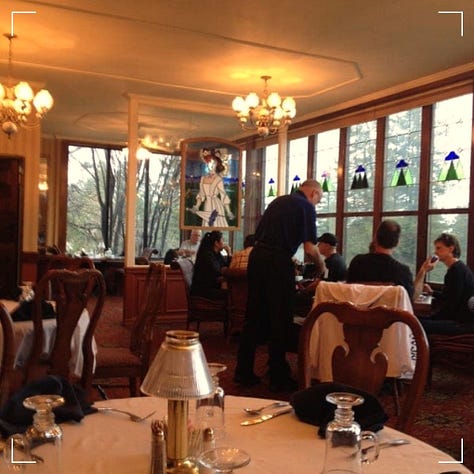
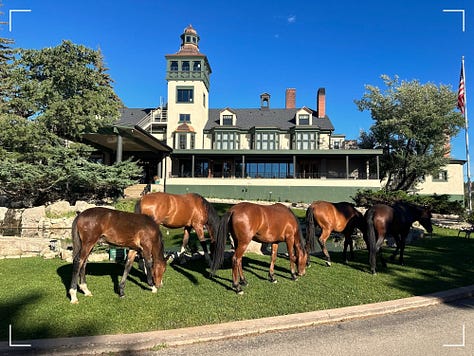
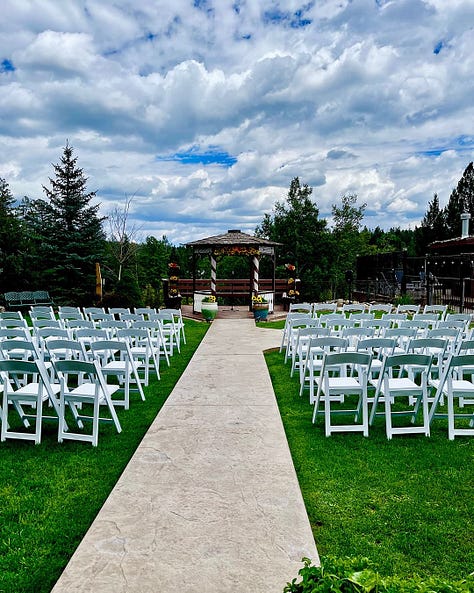


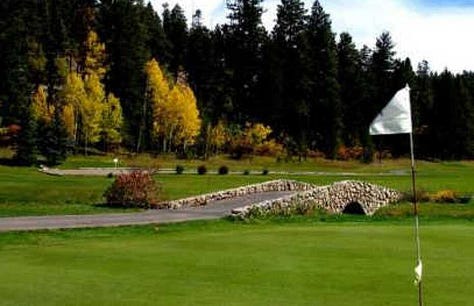

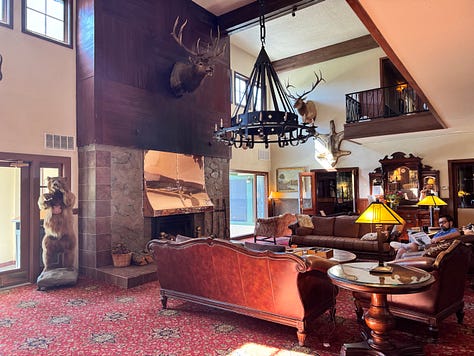

The reporting no one else does.
Become a Cloudcroft Star. Show us you like what we are doing. Your pledge of support helps us keep the Cloudcroft community informed on issues and people that matter.
Special thanks to our Cloudcroft Stars who have made pledges:



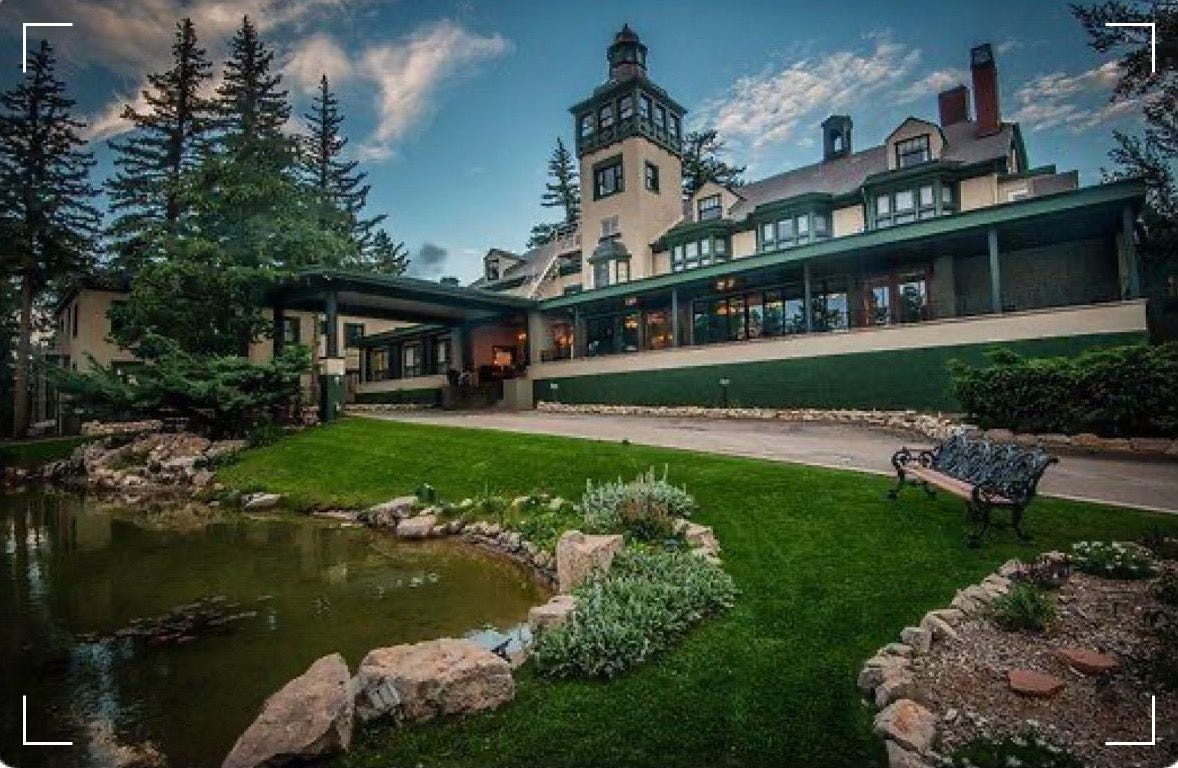


Great story about the Lodge!